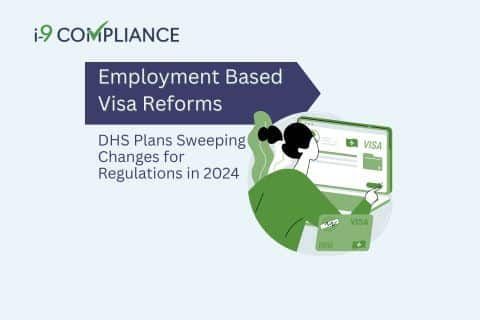DHS Plans Sweeping Employment Based Visa Reforms for Late 2024

The U.S. Department of Homeland Security (DHS) recently announced an interest in updating several rules. According to the DHS, the agency will introduce sweeping changes to regulations governing employment-based immigration in 2024. They would create greater flexibility for nonimmigrant employees and religious workers.
The DHS introduced these intentions in its semiannual regulatory agenda. The aim is to increase “flexibilities for certain nonimmigrant workers, including those who resign or are terminated from employment and religious workers who have reached their maximum period of stay or are waiting for immigrant visas to become available.” The agenda also mentioned modernizing the policies and procedures for Employment Authorization Documents.
Other proposed changes include the regulations governing employment-based immigrant petitions for the “first, second, and third preference classifications.” These categories encompass various classifications, including unskilled, professional, and skilled workers. Generally, these individuals work in the U.S. based upon petitions filed by employers to gain valuable skills and talent. The regulatory agenda does not offer many details for these proposals.
However, it does provide some indication of possible expectations for religious workers. Some speculate that this statement responds to suggestions concerning the U.S. Citizenship and Immigration Services (USCIS). These suggestions include reducing how long workers must remain outside the U.S. before returning to a nonimmigrant status. The DHS estimates it will publish a notice of proposed rulemaking in the Federal Register in October 2024.
The DHS also commented on the regulations governing EB-1, EB-2, and EB-2 workers. If finalized, the rule would “codify current policy guidance and implement administrative decisions regarding successorship-in-interest and ability to pay,” which would formalize these policies. The announcement would also update provisions regarding individuals of extraordinary ability and outstanding professors and researchers.
The DHS hopes to clarify the evidentiary requirements for the EB-1 and EB-2 national interest waiver classifications and physicians of national and international renown. Finally, it would correct errors and omissions and introduce reforms to guarantee the integrity of the Immigrant Petition for Alien Workers program (Form I-140). Interested parties can expect the notice of proposed rulemaking for these regulations in August 2024.
It remains uncertain what form these regulations will take and whether they will finalize. As such, employers should monitor the possible changes and stay updated on the ever-shifting rules. Employment eligibility verification (Form I-9) is one process that sees regular revisions.
Form I-9 has proven complex for many employers, especially those hiring foreign national workers. The best way to help ensure compliance is with an electronic I-9 management system. This system helps automate the process and provides guidance, electronic storage, and an option for E-Verify integration.
Ensure compliance today by switching to an electronic I-9 management tool with I-9Compliance.